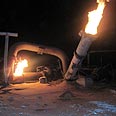
Gas supplies to Israel have been disrupted by a series of attacks on the pipeline in the Sinai border region by assailants believed to oppose the sale of gas to the Jewish state.
The attacks became more frequent and supplies were halted after the overthrow of Egypt's President Hosni Mubarak in February.
The army-backed interim government, under popular pressure to toughen its stance towards Israel, has sought to renegotiate the terms of the gas deal, saying that the previous agreement signed under Mubarak fixed prices below market rates.
"The final draft related to amending the prices for exporting natural gas to Israel will be completed soon. It will see a big increase in the price," newspaper Al Ahram reported, citing Petroleum Minister Abdullah Ghorab.
He said gas supplies to Israel were still suspended after the latest attack on the pipeline in Sinai in late September, Al Ahram reported.
Egypt is also seeking to renegotiate prices of gas exports to Jordan, which have also been disrupted by the attacks.
Economic slowdown
Ghorab said Egypt's proven natural gas reserves stood at 77.5 trillion cubic feet (2.19 trillion cubic meters), the paper said. That figure is little changed from the 77.2 trillion cubic feet given by the government in June 2009.
Al Ahram said Ghorab would present a paper to Egypt's supreme energy council proposing to cut energy subsidies for industries.
Subsidies, mainly for energy, accounted for more than a quarter of total spending in Egypt's 2010/11 budget. The government is grappling with an economic slowdown and rising costs after the uprising.
"In the coming few days I will present a project to the supreme energy council to change the prices as it is not reasonable to subsidize energy for industries that are making huge profits selling their products," Al Ahram quoted Ghorab as saying.
The minister said in March that the government was not considering raising the price that consumers pay for petroleum products.
- Follow Ynetnews on Facebook















